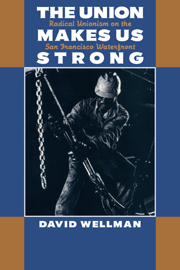Book contents
- Frontmatter
- Contents
- Preface
- Notes on unpublished sources
- PART I LABOR RADICALISM REVISITED
- PART II LOCAL COMMUNITY AND “TUMULTUOUS” DEMOCRACY: THE SOCIOCULTURAL FOUNDATIONS OF UNIONISM ON THE SAN FRANCISCO WATERFRONT
- PART III UNIONISM, WORK, AND TECHNOLOGICAL CHANGE
- PART IV WAGING THE BATTLE FOR WORKPLACE CONTROL ON CONTRACTUAL TERRAIN
- 10 Who decides how to work?
- 11 Which side's language shall govern?
- 12 By whose principles will merit be rewarded?
- PART V AGREEING TO DISAGREE: BEING DEFENSIBLY DISOBEDIENT
- Conclusion: Trade union exceptionalism or prefigurative politics?
- Appendix: Doing field research: An ethnographic account
- References
- Name index
- Subject index
11 - Which side's language shall govern?
Published online by Cambridge University Press: 11 November 2009
- Frontmatter
- Contents
- Preface
- Notes on unpublished sources
- PART I LABOR RADICALISM REVISITED
- PART II LOCAL COMMUNITY AND “TUMULTUOUS” DEMOCRACY: THE SOCIOCULTURAL FOUNDATIONS OF UNIONISM ON THE SAN FRANCISCO WATERFRONT
- PART III UNIONISM, WORK, AND TECHNOLOGICAL CHANGE
- PART IV WAGING THE BATTLE FOR WORKPLACE CONTROL ON CONTRACTUAL TERRAIN
- 10 Who decides how to work?
- 11 Which side's language shall govern?
- 12 By whose principles will merit be rewarded?
- PART V AGREEING TO DISAGREE: BEING DEFENSIBLY DISOBEDIENT
- Conclusion: Trade union exceptionalism or prefigurative politics?
- Appendix: Doing field research: An ethnographic account
- References
- Name index
- Subject index
Summary
IMPORTANT as it may be, the struggle over how to work is only one front in a larger battle for control of the waterfront. Formulating and interpreting contractual language is another theater in this war. Despite fifty years of collective bargaining, and almost thirty years after the M&M Agreements were signed, the differences between Local 10 and the PMA are so deep that the two sides operate with different vocabularies; they do not even agree on the very language specifying the terms of their cooperation. When the collective agreement is being formulated, they battle over whose language will be used; when it is signed, the struggle continues, and the issue becomes whose understanding of the contract will prevail? Thus, even though they live by the same contractual language, they battle over the naming of disputed activities. These disagreements surface in two contexts: in contract negotiations, where contractual language is constructed; and in the grievance machinery, where operating definitions of disputed activities are contested.
“TRYING TO COME UP WITH LANGUAGE WE CAN BOTH LIVE WITH”: WORDING CONTRACTS
Negotiations are set up to try to get rid of problems. You've got certain problems, we've got certain problems. You've got certain things that stick in your craw, we've got certain things that stick in ours. You've got certain things you can't live with, we've got certain things we can't live with. What we're trying to do in negotiations is to get language on issues that we can both live with. We're trying to come up with language that we can both live with in this situation.
- Type
- Chapter
- Information
- The Union Makes Us StrongRadical Unionism on the San Francisco Waterfront, pp. 225 - 241Publisher: Cambridge University PressPrint publication year: 1995



